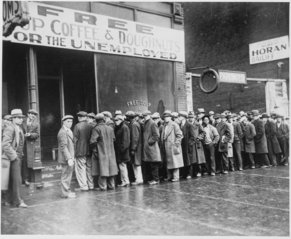
 |
A-Z | Popular | Blog | Economics | Search » |
|
Economics  Related
Moral Hazard  Related Topics
Economic Problems  Economic Problems  Competition  Economic Theories  Rent Seeking  Macroeconomics  Economies Of Scope  Invisible Hand  Price Economics  Business Economics  |
52 Useful Economic Theories John Spacey, updated on
 Absolute AdvantageThe ability to produce more than your competitors with the same amount of resources such as capital, labor and land. Generally equates to a cost advantage.Adverse SelectionThe tendency for people at high risk to buy insurance.Attention EconomicsAttention economics is the study of human attention as a scarce resource.Bargaining PowerBargaining power is the ability of parties to exert influence over each other in negotiation. Typically measured by how much each side has to lose if an agreement isn't reached. In other words, you tend to have a better negotiating position when you have little to lose.Barriers To EntryBarriers to entry are obstacles that make it difficult for new competitors to enter a market such as capital, know-how and government regulation.Barriers To ExitObstacles to closing a business or discontinuing a service.Behavioral EconomicsThe examination of cognitive, emotional and social factors in economic decisions. For example, asset prices are thought to be driven by cycles of optimism and fear.Category KillerA product or service that dominates a market.Club TheoryA business model based on shared infrastructure and resources such as a theme park.Coercive MonopolyA monopoly position that is obtained by preventing any firms from competing using extraordinary power.CommonsResources that are available to all members of society including cultural items, natural resources and public infrastructure.Critical MassThe size that a company needs to reach in order to compete efficiently in a market.Deadweight LossAn inefficiency in an economy that prevents markets from performing normally.Diminishing Marginal UtilityDiminishing marginal utility is a decrease in value for more of something. For example, you may find that a single smart phone is very useful but a second, third, forth or fifth mobile device has little value to you.Diminishing ReturnsDecreasing incremental output from additional resources. For example, if you put 1000 engineers on a project instead of 100 they may not finish much faster.Diseconomies Of ScaleDisadvantages faced by large organizations such as bureaucracy, heavy weight processes and inability to change.Economies Of DensityThe economic benefits of locating in a dense urban environment such as a city or a spot close to multiple cities.Economies Of ScaleA product or service that drops in cost as you produce more.Economies Of ScopeEconomies of scope are efficiencies gained by offering a variety of products and services.EquilibriumEquilibrium is a state in which economic forces such as supply and demand are in balance. As a general rule, everything moves towards equilibrium with time.Excess BurdenTaxation or regulation that is so intensive that it prevents markets from functioning normally.ExternalitiesA cost or benefit that isn't reflected in the price paid for a good or service.Failure DemandAdditional demand for an company's products or services due to that company's failures.Gains From TradeThe net gain achieved by countries, organizations or individuals from trade.Giffen GoodsA good that receives more demand at a higher price because people can no longer afford more expensive substitutes.Gift EconomyExchanges of value that are given unconditionally as opposed to traded or exchanged based on legal conditions.Inferior GoodA produce or service that you consume less as your income rises.Information AsymmetryA condition in which some market participants have better information than others.Invisible HandA metaphor for the unintended global or national impact of individual choices.Irrational ExuberanceAsset price bubbles driven by optimism.Managerial EconomicsA general term for economic models, first principles and metrics that are useful to business.Market PowerThe ability for an individual firm to raise the market price for a product or service.MonopsonyA market with one buyer and many sellers. Being the opposite of a monopoly, a monopsony has significant power to push sellers for low prices.Moral HazardA decision maker who is in a position to take risks without any consequences if things turn out badly. In some cases, such decision makers are heavily rewarded when risks bear fruit.Natural MonopolyA monopoly that makes economic sense because it would be too costly to duplicate infrastructure.Network EffectThe relationship between the value of a technology, product or service relative to the number of people who are using it.OverexploitationOveruse of a renewable resource to the point that it no longer renews as it once did. In other words, over production in a single year can damage an ecosystem for decades or in some cases, permanently.Perfect CompetitionA market in which no competitor has any advantage over any other. It is extremely difficult to profit in such a market as prices are driven towards cost.Perfect InformationWhen all market participants have the same information all the time.Predatory PricingA price strategy that attempts to put competitors out of business by offering a low price, often below cost.Price UmbrellaA price set by a dominant competitor that acts like price gravity affecting every other competitor in the same market.Rent SeekingStrategies that generate no value but act as a drag on economic efficiency such as lobbying a government for subsidies and trade barriers.SpeculationAttempting to profit from price swings in assets without investing for sustained periods of time in such assets. In efficient markets, speculation is typically unprofitable in the long run.Sticky PricesThe tendency for prices to stay at an established range and temporarily resist changes in supply and demand.Superior GoodAn expensive item that is mostly consumed by high income individuals.Switching BarriersThe obstacles that a customer faces to change from one product or service to another.Time PreferencesA preference for consuming now versus saving for the future.Tragedy Of The CommonsA tendency for shared resources such as air and water to be overused and abused.Tyranny Of Small DecisionsA tendency for seemingly rational local choices to have negative global consequences.Veblen GoodsGoods that receive more demand at a higher price due to perceptions of quality. Many luxury goods are veblen in the long term but not in the short term. In other words, high prices can be good for long term demand but if you have a sale, it temporarily boosts demand.White ElephantAn asset that is expensive to maintain and difficult to retire. Often applied to underperforming projects that are continued due to sunk costs.Zero-sum GameAn activity that produces no value but is concerned with gaining a bigger piece of existing value. Often described as dividing a pie instead of baking new pies.EconomicsThis is the complete list of articles we have written about economics.If you enjoyed this page, please consider bookmarking Simplicable.
Adverse Selection
The tendency for people at high risk to buy insurance.
Economic Advantage
A list of economic positions or capabilities that allow you to outperform in a particular industry.
Knowledge WorkA definition of knowledge work with examples.ProductionA definition of production with examples.Economic InfrastructureThe common types of economic infrastructure.
Business Competition
The common types of business competition.
InefficiencyThe common types of inefficiency.Supply Examples
An overview of supply with common examples.
Alpha vs Beta
The difference between two common investment measurements.
Regression Toward The Mean
An overview of Regression Toward The Mean.
Efficient Market HypothesisAn overview of the Efficient Market Hypothesis.
Animal Spirits
An overview of animal spirits, a theory of investing.
Financial MarketsA definition of financial market with examples.Mr Market
A definition of Mr. Market, an investing theory.
Organic Growth
A definition of organic growth with examples.
Concept Company
The common types of concept company.
Information CostsA definition of information costs with examples.Channel Check
The definition of channel check with examples.
TrendingThe most popular articles on Simplicable in the past day.New ArticlesRecent posts or updates on Simplicable. Site Map
Business
Business Analysis Business Models Capital Competition Consumer Behavior Economic Conditions Economic Systems Entrepreneurship Finance Financial Analysis Goods Government Industries Infrastructure Innovation Investment Marketing Marketing Economics Markets Microeconomics Pricing Productivity More ...
© 2010-2023 Simplicable. All Rights Reserved. Reproduction of materials found on this site, in any form, without explicit permission is prohibited. View credits & copyrights or citation information for this page. |